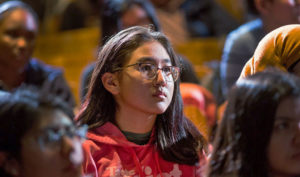In the metropolises of the West, shops that sell bubble tea — or boba, as it is commonly known — have proliferated over the past few years, a microcosm of the boom in East Asian cultural exports. At the same time, a term has become popular in the Asian diaspora, especially among Asian Americans: boba liberal. Like most phrases coined online this one is as slippery as the tapioca pearls in bubble tea. But it is safe to say that it is a pejorative, referring generally to middle-class Asian Americans who chase the validation of their non-Asian liberal peers, often acting in ways detrimental to other Asians.
Boba has a reputation for being a drink that’s all sugar and no substance. Likewise, a boba liberal is an Asian who uncritically subscribes to the Democrat party line that “diversity is our strength!”, while making shallow tributes to Asian-American identity, such as celebrating representation in Hollywood. While it is commonly used by conservatives, “boba liberalism” was actually named by the other sworn enemy of liberals: Leftists. It was coined by a socialist Twitter activist, who wrote that “Boba Liberalism is thinking t-shirts, products, and merchandise are the main way of affirming one’s racial identity”.
The term is also used to describe Asians who are deemed to have been “whitewashed” — to have abandoned their “authentic” Asian identity to assimilate into the middle class. But how do you decide what counts as “authentic”, when the whole concept of Asian-American identity is built on a shaky foundation? African Americans are mostly descended from individuals who crossed the Atlantic centuries ago as slaves, and are therefore disconnected from their ancestors: they had no choice but to create a new culture from scratch, which gives it a coherence. Asian Americans, by contrast, have only existed in significant numbers for the past few decades. They have stronger ties, as well as living relatives, with other hugely varying nations. Bureaucracy may still lump together East and South Asians, but the two groups are two distinct races in everyday life. Ironically, in an era when racial minorities are encouraged to think about themselves as categories on a census form, boba liberalism is pushing a pan-Asian identity that does not actually exist.
The recent New York Times article “What Does It Mean to Be an Asian American Brewer?” is a classic example of how that identity is pushed. The author emphasises how few Asians there are in the industry, and points how those breweries which have succeeded began using Asian motifs, such as Chinese Zodiac symbols, only once they became popular. The only real difference between an Asian and a non-Asian brewery, apparently, is that an Asian brewery engages in self-Orientalism so that the mostly non-Asian customers can get feel like they are getting an “exotic” experience, even though the beer tastes just like any classic American beer.
Over time, politically conservative Asian Americans have also come to enthusiastically adopt the term “boba liberal” — mainly because it gave them a chance to “own the libs”. Like Asian Leftists, conservative Asians view boba liberals as not possessing an authentic Asian-American identity, but for the Right, disparaging boba liberalism is not a way to critique capitalism. It is a way of taking aim at a small but influential group of progressive Asian-American activists who are supposedly selling out other Asians, especially working-class Asians, in order to win brownie points from elite, generally white liberals.
After all, Boba liberalism is, essentially, an Asian version of white liberalism — or wokeness. The core of this identity is self-flagellation, the sacred mission to “do the work” of atoning for being born white, the original sin. As Tom Holland has suggested, wokeness is a direct by-product of European Christian morality. And modern-day white liberalism has largely abandoned Christianity, but persistent is the desire to make up for the offences of one’s ancestors, and to see that the last shall be first and that the first shall be last.
As the most educated in society have adopted the tenets of this new religion, people who want access to elite spaces feel immense pressure to convert. Asian Americans from middle- to upper-class families are typically from majority-white neighbourhoods, and the urge to join the club is immense. (This demographic has the highest rates of getting into elite colleges.) Since white guilt is in vogue among their white liberal peers, they have created their own version.
Boba liberals cleave to the idea that that “anti-blackness” is endemic in Asian-American communities. In Liquor Store Dreams, for example, the Korean American filmmaker So Yun Um turns her parents’ experience of running a shop in a majority-black neighbourhood into a critique of this supposed anti-black racism. Her parents were working-class immigrants who toiled for decades to give her a better life, but she has risen above them socially, becoming a filmmaker — and is now castigating them to gain acceptance in her new class.
In an interview to promote the film, she tells the story of a Korean American friend who was accosted and robbed on the street by a black person. Her friend felt conflicted because he didn’t want to bring race into how he viewed the incident. The rest of the interview focuses on the myriad ways Korean Americans are said to perpetuate anti-blackness. When discussing attacks on Asians, for instance, she says: “If you’re in a predominantly black and brown neighbourhood, if an accident were happening, who else would be the assailant? It wouldn’t be a white person because a white person doesn’t live there.” Note her use of the word “accident”, rather than, say, “attack”. By doing so she is unintentionally perpetuating the obviously racist idea that a black person can’t help being an “assailant”; it denies black Americans agency. There is no similar call for black Americans to “unlearn anti-Asianness”, because in a boba liberal’s mind, how can they possibly take responsibility for their actions?
While boba liberals may experience anti-Asian racism themselves, they know there is little social capital to be gained from discussing it. The common assumption is that Asians are mostly well-off and do not need liberal saviours, unlike black Americans. The latter are often portrayed in popular culture as living tough lives in “the hood”. But working-class Asians tend to cluster in ethnic enclaves that receive very little media attention. The dominant Asian stereotype is of the “crazy rich Asian”. Boba liberals will intentionally distance themselves from these working-class Asians. Anyone who doesn’t toe the progressive party line on every issue is actually an ally of white supremacists.
Unsurprisingly, then, boba liberals often support affirmative action over merit-based admissions policies. In other words, they support a process based not on a clear set of consistently applied rules, but on more nebulous, unspoken criteria set by elite ideology. This benefits them, because they understand the “right” things to do and say to gain access to institutions such as Harvard. Working-class Asian Americans have little-to-no social capital and have the “wrong ideas”, however, and thus prefer merit-based admissions policies that don’t require intricate knowledge of elite codes.
But being against affirmative action is considered “wrong” by affluent progressives; for them, the policy is an accessory they can tout to signal that they believe in the value of having a superficially multiracial ruling class. And just as affluent white liberals feel ashamed about white MAGA voters or Brexiteers, boba liberals are embarrassed by working-class Asians and their “incorrect” views.
As Rob Henderson has pointed out, Asian Americans are adopting “luxury beliefs, which are ideas and opinions that confer status on the upper class while often inflicting costs on the lower classes” — which he sees as “an indicator of assimilation” into upper-middle class America. A similar phenomenon is happening among Latinos: the college-educated now use the term “Latinx” as a class signifier, a term that is deeply unpopular with the vast majority of Latinos. It seems, then, that racial solidarity is not as powerful as class solidarity. America’s liberal elite have all converged on one value system that sets them apart, while pretending to be “diverse” through shallow imitations of identity.
Disclaimer
Some of the posts we share are controversial and we do not necessarily agree with them in the whole extend. Sometimes we agree with the content or part of it but we do not agree with the narration or language. Nevertheless we find them somehow interesting, valuable and/or informative or we share them, because we strongly believe in freedom of speech, free press and journalism. We strongly encourage you to have a critical approach to all the content, do your own research and analysis to build your own opinion.
We would be glad to have your feedback.
Source: UnHerd Read the original article here: https://unherd.com/



